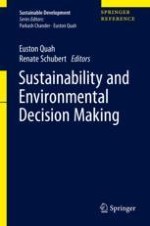2021 | OriginalPaper | Chapter
5. Environmental Decision Making in Small Companies: A Behavioral Economics Perspective
Authors : Manuel Grieder, Deborah Kistler, Jan Schmitz
Published in: Sustainability and Environmental Decision Making
Publisher: Springer Singapore
Activate our intelligent search to find suitable subject content or patents.
Select sections of text to find matching patents with Artificial Intelligence. powered by
Select sections of text to find additional relevant content using AI-assisted search. powered by
